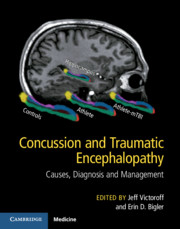Book contents
- Concussion and Traumatic Encephalopathy
- Concussion and Traumatic Encephalopathy
- Copyright page
- Dedication
- Contents
- Guiding Apophthegm
- List of Contributors
- Preface
- Acknowledgments
- Introduction
- Part I What Is a Concussion?
- Part II Outcomes after Concussion
- Part III Diagnosis and Management of Concussion
- 15 The Great CT Debate
- 16 Structural Neuroimaging of Persistent or Delayed-Onset Encephalopathy Following Repetitive Concussive Brain Injuries
- 17 Biomarkers for Concussion: The Need and the Prospects for the Near Future
- 18 Pediatric Concussion: Understanding, Assessment, and Management, with Special Attention to Sports-Related Brain Injury
- 19 Contribution of Objective Tests to the Diagnosis of Sport-Related Concussion
- 20 Deployment Stress and Concussive Brain Injury: Diagnostic Challenges in Polytrauma Care
- 21 How Should One Measure “Outcome” of Concussion?: An Introduction to the Common Data Elements for Mild TBI and Concussion
- 22 Functional Neuroimaging of Concussion
- 23 Civilian Post-Concussive Headache
- 24 Fatigue after Concussion: Epidemiology, Causal Factors, Assessment, and Management
- 25 Sleep Disorders after Typical Concussive Brain Injury: Classification, Diagnosis, and Management
- 26 Neuroendocrine Dysfunction Following Concussion: A Missed Opportunity for Enhancing Recovery?
- 27 Evidence-Based Rehabilitation in Typical Concussive Brain Injury: Results of a Systematic Review
- 28 A Modest Plea
- Index
- References
28 - A Modest Plea
from Part III - Diagnosis and Management of Concussion
Published online by Cambridge University Press: 22 February 2019
- Concussion and Traumatic Encephalopathy
- Concussion and Traumatic Encephalopathy
- Copyright page
- Dedication
- Contents
- Guiding Apophthegm
- List of Contributors
- Preface
- Acknowledgments
- Introduction
- Part I What Is a Concussion?
- Part II Outcomes after Concussion
- Part III Diagnosis and Management of Concussion
- 15 The Great CT Debate
- 16 Structural Neuroimaging of Persistent or Delayed-Onset Encephalopathy Following Repetitive Concussive Brain Injuries
- 17 Biomarkers for Concussion: The Need and the Prospects for the Near Future
- 18 Pediatric Concussion: Understanding, Assessment, and Management, with Special Attention to Sports-Related Brain Injury
- 19 Contribution of Objective Tests to the Diagnosis of Sport-Related Concussion
- 20 Deployment Stress and Concussive Brain Injury: Diagnostic Challenges in Polytrauma Care
- 21 How Should One Measure “Outcome” of Concussion?: An Introduction to the Common Data Elements for Mild TBI and Concussion
- 22 Functional Neuroimaging of Concussion
- 23 Civilian Post-Concussive Headache
- 24 Fatigue after Concussion: Epidemiology, Causal Factors, Assessment, and Management
- 25 Sleep Disorders after Typical Concussive Brain Injury: Classification, Diagnosis, and Management
- 26 Neuroendocrine Dysfunction Following Concussion: A Missed Opportunity for Enhancing Recovery?
- 27 Evidence-Based Rehabilitation in Typical Concussive Brain Injury: Results of a Systematic Review
- 28 A Modest Plea
- Index
- References
Summary
- Type
- Chapter
- Information
- Concussion and Traumatic EncephalopathyCauses, Diagnosis and Management, pp. 800 - 808Publisher: Cambridge University PressPrint publication year: 2019



